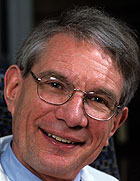F. Sessions Cole, M.D., the Park J. White, M.D., Professor of Pediatrics and assistant vice chancellor for children’s health, has been awarded a nearly $2 million, five-year grant to establish a career development program in the genetics and genomics of lung disease.

The grant is one of three K12 career development awards made by the National Heart, Lung, and Blood Institute (NHLBI) of the National Institutes of Health (NIH) this year. The money will go for the creation of a multidisciplinary program to educate young pulmonary scientists in methods of genetics and genomics research. The scientists can then become independent investigators and assume leadership roles in the genetics and genomics of pulmonary diseases. Program participants will focus on inflammatory airway disease, including asthma, cystic fibrosis and chronic obstructive pulmonary disease.
Cole is program director, and Michael R. DeBaun, M.D., professor of pediatrics, of neurology and of biostatistics, is co-director. Also involved in the program’s leadership are D.C. Rao, Ph.D., professor and director of the Division of Biostatistics; Michael J. Holtzman, M.D., the Selma and Herman Seldin Professor of Medicine; Richard Wilson, Ph.D., professor of genetics; and Susan K. Dutcher, Ph.D., professor and interim head of the Department of Genetics.
“This grant provides us an opportunity to harness for education the power of genomics and genetics here and really focus that education on lung diseases,” said Cole, also director of St. Louis Children’s Hospital’s Division of Newborn Medicine. “The grant harmonizes well with the Children’s Discovery Institute, which is also linked to the strong genetics and genomics environment here at the School of Medicine. The NHLBI has affirmed its faith in us as an institutional environment where cutting-edge genetics and genomics can be applied to the most complex diseases that occur in lungs.”
Scholars in the program will study in the yearlong Genetic Epidemiology Masters of Science (GEMS) Training Program sponsored by the Division of Biostatistics and conduct research with more than 30 School of Medicine faculty from a variety of disciplines. Faculty also will assist the scholars in preparing independent research grants.
“I am very enthusiastic about building this training program around GEMS and could not be more pleased,” said Rao, GEMS program director. “It is a remarkable coincidence that as we were creating a clinical track in the GEMS program to train physician-scientists, Dr. Cole was applying for the K12 grant. It’s very gratifying that our goals were successfully converged.”
The funding provides for three scholars per year. Each scholar will have three “educational immersion experiences” during which they will work in labs and then select one area on which to focus and to write a thesis.
Cole said he expects to begin recruiting potential scholars Jan. 1 for the program, which will begin June 1.
For more information or to apply, contact Cole at fcole@wustl.edu.